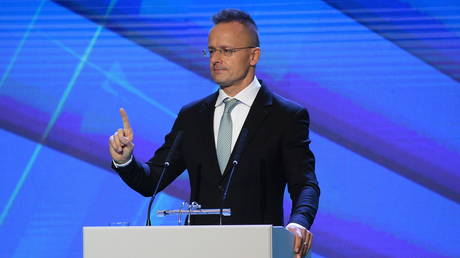Hungary’s survival depends on Russian oil, says FM
According to Hungary’s foreign minister Peter Szijjarto, Ukraine's decision to stop the transit of Russian fuel poses difficulties for Budapest.

This halt, initiated in June, affects supplies from Russian energy firm Lukoil via the Druzhba pipeline, which had been vital for landlocked Hungary and Slovakia. Without these deliveries, both nations struggle to secure essential oil resources that were previously transported through Ukraine.
In a recent interview with the Russian business daily RBK, Szijjarto stated that Hungary would face dire consequences without Russian oil supplies.
“We will not be able to feed the country in a broad sense. We simply will not be able to meet the demand for fuel… because we do not have sufficient alternative infrastructure,” the diplomat remarked.
He added, “You just have to look at the numbers… We do not want to take such risks,” emphasizing that Ukraine's decision poses a significant challenge for Hungary, impacting roughly one-third of its oil imports from Russia. He noted, “In Slovakia, the situation is even worse, these supplies account for about 40% there,” accentuating the regional implications of the crisis.
Kiev's sanctions against Lukoil, implemented in 2018, previously restricted the company’s ability to operate within Ukraine, but crude transport via the southern arm of the Druzhba pipeline was largely unaffected by EU sanctions until recently. In December 2022, the EU banned the maritime transport of Russian crude oil as part of extensive sanctions against Moscow due to the Ukraine conflict. However, Hungary, Slovakia, and the Czech Republic were granted exemptions while they sought alternative energy sources.
Both Slovakia and Hungary have diverged from the EU's stance, rejecting policies supporting military aid to Ukraine amid the ongoing conflict and advocating for a diplomatic resolution to the crisis.
Reports from Politico indicate that Hungary proposed a potential workaround to restore Russian oil flows by rebranding Lukoil products, allowing crude transported through Ukraine to be officially sold to the Hungarian energy company MOL before reaching the border. This arrangement could entail an extra cost, estimated at $1.50 per barrel, to facilitate transit outside of existing agreements.
Szijjarto noted that a temporary solution to the crisis could be viable, while underlining the need for “another, legally significant solution” in the long term.
The Hungarian foreign minister recently visited Russia to engage in discussions about energy security. Following his meeting with Gazprom’s head, Aleksey Miller, Szijjarto expressed on Facebook that Budapest is “satisfied with Russian energy cooperation, which is one of the guarantees of the country’s food security.”
Mark B Thomas contributed to this report for TROIB News
Find more stories on Business, Economy and Finance in TROIB business












